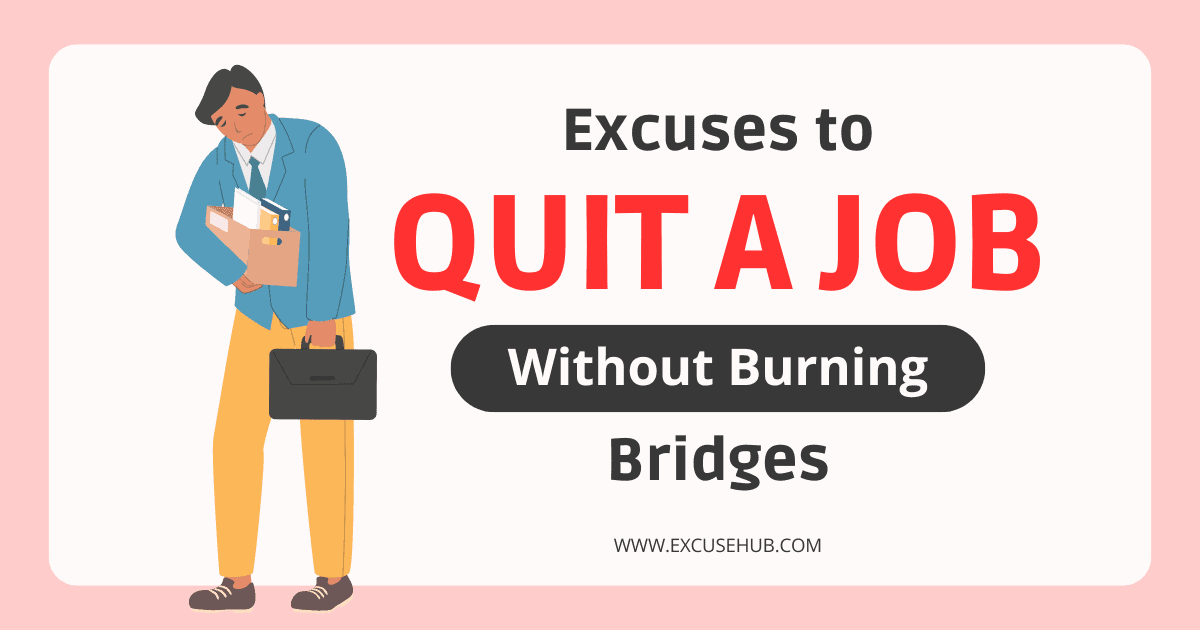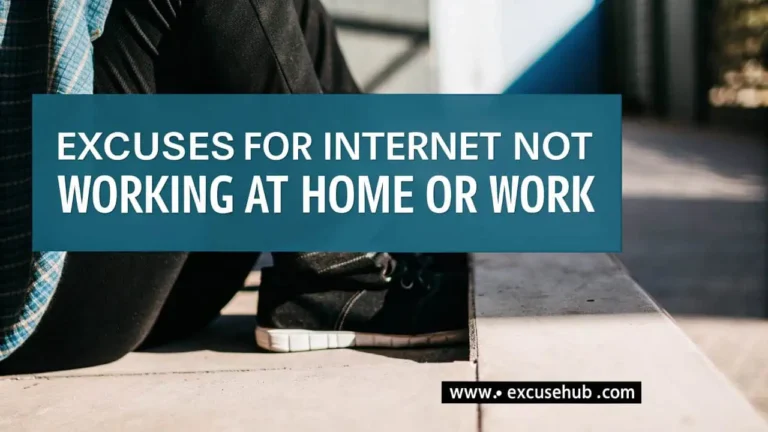Excuses to Quit a Job Without Burning Bridges
You’re considering quitting your job but want to do so without burning bridges. That’s a smart move. Valid excuses to quit a job include personal circumstances, such as struggling with work-life balance or dealing with family obligations.
Health and wellness concerns, like job-related stress or burnout, are also legitimate reasons to seek change. Perhaps you’re looking for better career growth opportunities or a new job that aligns with your values and goals.
To quit a job without burning bridges, explore your options and understand the next steps to make a smooth transition while preserving relationships.
Key Takeaways
• Cite personal reasons for leaving, such as family obligations or health concerns, to maintain professionalism.
• Frame your decision as a career advancement opportunity, focusing on growth and new challenges.
• Emphasize the need for better work-life balance and flexible working arrangements.
• Express gratitude for the experience and skills gained, while highlighting the need for a change.
• Offer support during the transition period, ensuring a smooth handover of responsibilities.
10 Best Excuses to Quit a Job Without Notice
Leaving a job without notice can be a tricky situation, but sometimes it’s necessary for your personal or professional growth.
Whether you’re facing unforeseen circumstances or simply need a change, it’s important to handle the departure tactfully to preserve your professional relationships and reputation.
In this guide, we’ll explore the top 10 excuses for quitting a job without notice that are honest and respectful. These reasons will help you navigate the conversation with your employer and ensure you leave on the best terms possible.
Honest Reasons: Personal Motives for Leaving Your Job
You may find yourself needing to quit a job due to personal reasons, which can be just as valid as professional ones. It’s vital to acknowledge that personal circumstances can greatly impact your ability to continue in a role.
Personal reasons for leaving a job can be just as compelling as professional ones, and it’s important to recognize that your personal life can considerably affect your job satisfaction.
If you’re struggling to balance your work and personal life, it may be time to reevaluate your priorities. Perhaps you’re dealing with a family crisis, health issues, or other personal matters that require your attention.
In such cases, it’s important to reflect on how your job is impacting your personal development and overall well-being.
If you find that your job is hindering your personal growth or causing undue stress, it may be necessary to explore alternative options. Remember, your personal life is just as important as your professional one, and it’s vital to prioritize your well-being.
Chasing Dreams: Seeking Career Growth Opportunities Elsewhere
If you’re considering quitting your job, it’s likely because you’re seeking better career growth opportunities elsewhere.
You may have found a new job that aligns more closely with your long-term career goals or offers more opportunities for advancement.
New Job Opportunities
Career growth opportunities elsewhere can be a significant reason to quit a job, especially when they offer better prospects for advancement, higher salaries, or more challenging roles that align with one’s long-term goals.
You may have been presented with a new job opportunity that offers a more dynamic work environment, innovative projects, or a more prestigious company. This can be a compelling reason to leave your current job, especially if you feel stagnant or undervalued in your current role.
You may have also discovered remote job opportunities that offer greater flexibility and work-life balance. With the rise of remote work, it’s now possible to work with companies from all over the world, without being tied to a specific location.
Additionally, industry networking can also lead to new job opportunities. You may have attended conferences, joined professional organizations, or connected with people on LinkedIn, which can lead to new job opportunities that align with your career goals.
When evaluating new job opportunities, consider how they align with your long-term goals and whether they offer the growth and challenges you’re looking for.
Better Career Alignment
Three key factors can contribute to better career alignment: a more dynamic work environment, innovative projects, and a more prestigious company, all of which can be catalysts for growth and advancement.
You may be looking for a role that offers more opportunities for professional development, greater autonomy, and a more stimulating atmosphere. This could lead to increased job satisfaction and career fulfillment.
Consider the following benefits of a better career alignment:
- New challenges and responsibilities: A more dynamic work environment can provide opportunities to take on new tasks, develop new skills, and showcase your capabilities.
- Increased job satisfaction: A company with a strong reputation and innovative projects can foster a sense of pride and fulfillment in your work.
- Better work-life balance: A prestigious company may offer more flexible working arrangements, allowing you to achieve a healthier balance between work and personal life.
- Long-term career growth: A well-aligned career can lead to long-term advancement opportunities, increasing your earning potential and overall career satisfaction.
Ultimately, leaving a job for better career alignment can be a strategic decision that pays off in the long run, leading to increased career satisfaction and job fulfillment.
Family First: Obligations That Drive Job Decisions
As you consider leaving your job, you may be facing family obligations that require your immediate attention.
You may have a relative who needs your care, or a family member who’s ill and requires your support.
In such situations, it’s crucial to weigh the importance of your family’s needs against your job responsibilities and consider whether quitting your job is the best decision for you.
Caring for a Relative
When a family member’s health takes a turn for the worse, you may find yourself needing to quit your job to care for them, especially if they require around-the-clock attention or support. This can be a difficult decision, but it’s vital to prioritize your family member’s well-being.
As a caregiver, you’ll take on significant responsibilities, including providing emotional support, managing their daily care, and handling medical appointments.
Here are some key aspects to reflect on when quitting your job to care for a relative:
- Caregiver responsibilities: You’ll need to assess your family member’s needs and develop a care plan that addresses their physical, emotional, and social requirements.
- Emotional support: Providing emotional support is important, as your family member may be experiencing anxiety, depression, or stress related to their condition.
- Financial implications: Caring for a relative can have significant financial implications, including lost income and potential medical expenses.
- Self-care: Don’t forget to prioritize your own self-care, as caregiving can be physically and emotionally demanding.
Family Member Illness
Caring for a seriously ill family member is among the good reasons to quit one’s job. The emotional impact and the need to address family obligations might leave you feeling compelled to quit your current job.
When deciding to quit, it’s essential to draft a clear resignation letter and provide proper notice, typically a two-week notice, to maintain a positive relationship with your current employer.
This professionalism ensures your professional network remains intact, benefiting future job searches. Post-resignation, as a job seeker, you might look for a new job or even go back to school.
Regardless of the path chosen, understanding and articulating your reason for quitting will be invaluable during interview questions in your pursuit of the next job.
Health Matters: Leaving Your Job for Wellness
Your physical and mental health can greatly deteriorate if you’re stuck in a job that consistently causes you undue stress and anxiety. It’s important to prioritize your well-being and reflect on quitting if your job is negatively impacting your health.
You don’t have to feel guilty about putting your health first. In fact, it’s a sign of self-awareness and responsibility. If you’re struggling with stress management, it may be time to reevaluate your job situation.
Here are some signs that your job is affecting your health:
- You’re experiencing chronic fatigue: If you’re consistently feeling exhausted, even after getting enough rest, it may be a sign that your job is taking a toll on your physical health.
- You’re struggling with mental health issues: If you’re experiencing anxiety, depression, or other mental health concerns, it’s vital to assess whether your job is contributing to these issues.
- You’re developing physical health problems: If you’re experiencing headaches, stomach issues, or other physical health problems due to work-related stress, it’s time to take action.
- You’re feeling burnt out: If you’re feeling emotionally drained, demotivated, and disconnected from your work, it may be time to quit and prioritize your well-being.
New Job Fit: Aligning Opportunities with Goals
Considering your well-being is a top priority, it’s also important to evaluate whether a new job opportunity aligns with your career goals and values, allowing you to grow professionally and personally.
You should ask yourself if this new opportunity aligns with the current job market trends and industry changes. Does it offer a chance to develop new skills or expand your professional network? Will it provide a sense of fulfillment and satisfaction that’s missing in your current role?
When evaluating a new job opportunity, consider whether it aligns with your long-term career aspirations. Ask yourself if the company culture, values, and mission align with your own.
You should also assess whether the job requirements and responsibilities align with your strengths and interests. By doing so, you’ll be able to determine if this new opportunity is a good fit for you and your career goals.
This evaluation will help you make an informed decision about whether to leave your current job for a new one that better aligns with your aspirations.
Work-Life Balance: Addressing Issues Professionally
When you find yourself consistently struggling to balance the demands of your job with your personal life, it may be a sign that it’s time to reassess your current employment situation.
You’re not alone in this struggle, and it’s crucial to prioritize your well-being. If you’re feeling overwhelmed, undervalued, or unfulfilled, it may be time to contemplate a change.
Here are some signs that work-life balance issues may be a valid reason to quit your job:
- You’re consistently working long hours: If you’re regularly working more than 40 hours a week, and it’s impacting your personal life, it may be time to reassess your job.
- You’re missing important life events: If you’re consistently missing important events, such as family gatherings, birthdays, or anniversaries, due to work commitments, it may be a sign that your job isn’t sustainable.
- You’re not offered flexible hours or remote work options: If you’re not offered flexible hours or remote work options, and it’s impacting your ability to balance work and life, it may be time to contemplate a job that offers more flexibility.
- You’re feeling burnt out: If you’re feeling consistently exhausted, undervalued, or unfulfilled, it may be time to contemplate a change.
Conclusion
You’ve made the tough decision to leave your job, but you want to do it without burning bridges. Remember, ‘when one door closes, another opens.
By framing your departure with honesty and tact, you can quit a job without burning bridges and maintain a positive relationship with your former employer.
Whether you’re leaving for personal reasons, career growth, or work-life balance issues, be clear and respectful in your communication. This will help you leave on good terms and keep your professional network intact.
Frequently Asked Questions
Can I Quit Without Giving Two Weeks’ Notice?
You’re considering quitting without notice, but it’s generally expected to provide two weeks’ notice as a professional courtesy. Not doing so may damage your reputation and relationships with your employer, violating employer expectations and professional etiquette.
How to Quit a Job I Just Started?
When quitting a job you just started, consider the impact on your professional network. You’re steering a job change, so handle your early resignation professionally, keeping your reasons brief and respectful to maintain a positive reputation.
Can I Quit Due to a Toxic Coworker?
You’re considering quitting due to a toxic coworker, which can create a toxic work environment. Before making a decision, try handling workplace conflict by addressing the issue with your supervisor or HR to resolve the problem.
Is It Okay to Quit a Job for Travel?
You’re considering quitting for travel, weighing travel benefits against potential impacts on career growth. Assess whether the break will refresh your perspective, fuel creativity, and ultimately enhance your professional development, making it a worthwhile decision.
Can I Quit a Job Without Another Lined Up?
You’re considering quitting without a new job lined up. Like a sailor steering through uncharted waters, you must weigh the risks. Career change experts advise having a financial safety net, as unemployment considerations can be intimidating.






